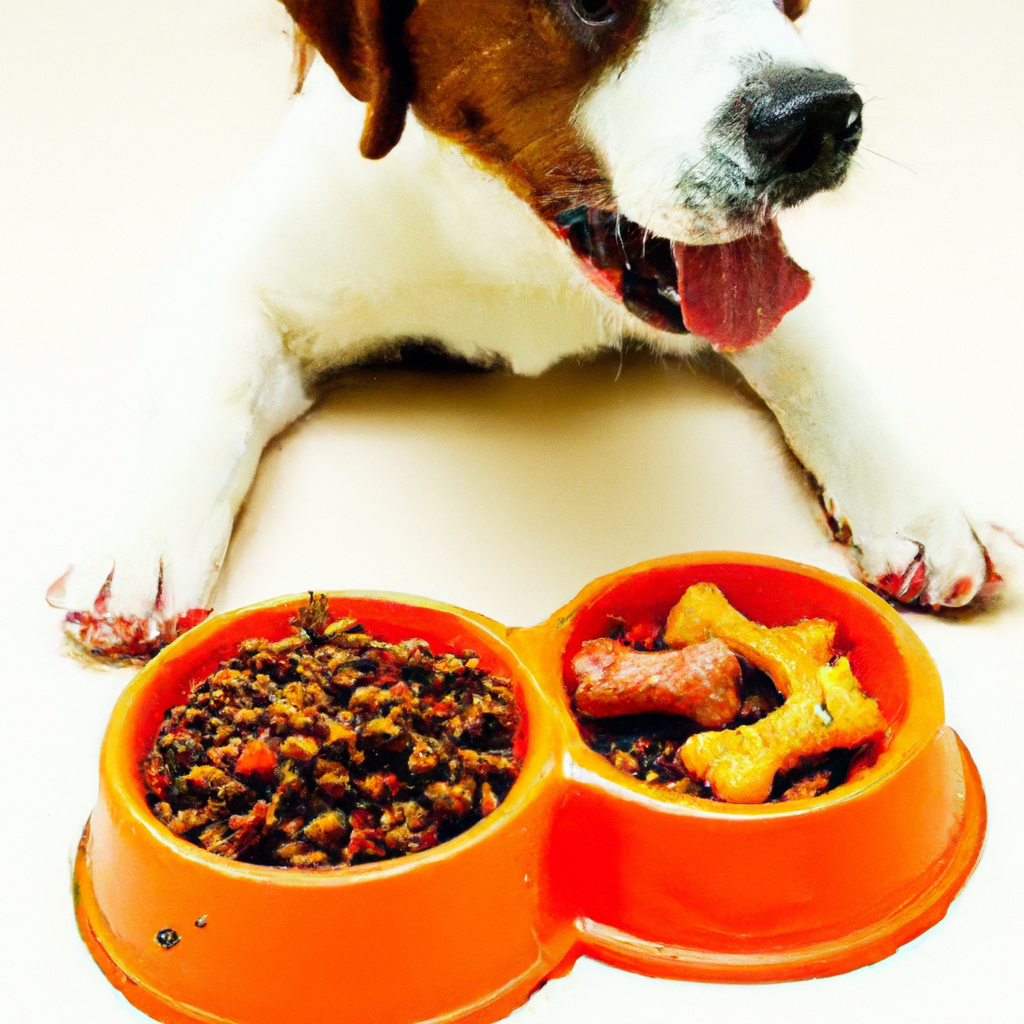So, you’ve got a furry friend at home and you want to make sure they’re getting the best possible nutrition for optimal wellness, right? Well, you’re in luck because we’ve got some valuable insights on what exactly you should be feeding your dog. Whether you’re a new dog owner or just looking to revamp your pup’s diet, this article will give you some practical tips and guidelines to ensure your four-legged companion is getting the nutrients they need to thrive. From understanding their dietary requirements to deciphering ingredient labels, let’s dive into the world of dog nutrition and set your pup up for a lifetime of good health.

Why Nutrition is Important for Dogs
Proper nutrition is crucial for the overall health and well-being of your furry friend. Just like humans, dogs require a balanced and nutritious diet to support their growth, development, and optimal functioning of their organs and systems.
Proper nutrition promotes overall health
When you provide your dog with the right nutrients, you are promoting their overall health. A well-balanced diet helps maintain healthy bones, teeth, and muscles. It also contributes to healthy skin and a shiny coat. Proper nutrition can even improve digestion and promote a healthy weight, reducing the risk of obesity-related health issues.
Nutrition affects energy levels and behavior
The food your dog consumes directly impacts their energy levels and behavior. Giving your furry companion the right balance of nutrients provides them with the energy they need to stay active and playful. A well-fed dog is more likely to exhibit positive behavior, be alert, and responsive to training.
Good nutrition supports a strong immune system
A strong immune system is vital for your dog’s ability to fight off illnesses and stay healthy. Proper nutrition plays a key role in strengthening the immune system, ensuring that your dog can ward off infections and diseases. When their immune system is functioning optimally, your dog is better equipped to enjoy a long and healthy life.
Understanding Your Dog’s Nutritional Needs
To ensure your dog’s nutritional needs are met, you must consider various factors that determine their dietary requirements.
Consider your dog’s age and life stage
As your dog ages, their nutritional needs change. Puppies require a diet rich in nutrients to support their rapid growth and development. Adult dogs have different needs, and senior dogs may require specific dietary adjustments to support aging joints and overall health. Understanding your dog’s life stage is essential in providing them with the appropriate nutrition.
Take into account breed and size
Different dog breeds and sizes have unique dietary requirements. Larger breeds, for instance, may benefit from food formulated to support joint health, as they are more prone to joint-related issues. Smaller breeds may have faster metabolisms, requiring a higher calorie intake. Always consider your dog’s breed and size when choosing their food.
Account for any special dietary requirements or medical conditions
Some dogs may have specific dietary needs due to allergies, food sensitivities, or medical conditions like diabetes or kidney disease. It is essential to consult with your veterinarian to identify any special dietary requirements and choose the right food that addresses your dog’s unique needs.
Choosing the Right Dog Food
Determining the right dog food can be overwhelming with the numerous options available on the market. However, with some guidance, you can make an informed decision.
Consult with your veterinarian for recommendations
Your veterinarian is a valuable resource when it comes to choosing the right food for your dog. They can take into account your dog’s specific needs, such as age, breed, and any medical conditions, and recommend a suitable diet. Consulting with a professional ensures that your dog’s nutritional needs are met.
Look for high-quality ingredients
When selecting dog food, prioritize high-quality ingredients. Look for whole meats, such as chicken or beef, as the main ingredient. Avoid foods that contain fillers, artificial additives, or by-products. High-quality ingredients provide essential nutrients and are more digestible for your dog.
Consider the right balance of nutrients
A balanced diet for dogs should include a proper ratio of proteins, carbohydrates, fats, vitamins, and minerals. Ensure that the dog food you choose provides all the necessary nutrients to support your dog’s overall health. Ideally, the food should meet the standards set by reputable organizations, such as the Association of American Feed Control Officials (AAFCO).
Feeding Your Dog a Balanced Diet
Feeding your dog a balanced diet involves considering various nutrient categories to meet their specific needs.
Include a variety of proteins
Proteins are the building blocks of your dog’s body and play a crucial role in muscle development and repair. Include a variety of high-quality protein sources, such as chicken, beef, fish, and lamb, in your dog’s diet. This ensures they receive all the essential amino acids necessary for their overall health.
Incorporate carbohydrates for energy
Carbohydrates provide energy for your dog’s daily activities. Whole grains, such as brown rice and oats, are excellent sources of carbohydrates. They also contain fiber, which aids in digestion. Ensure that the carbohydrates in your dog’s diet come from wholesome sources and avoid foods that are high in refined carbohydrates or grains.
Include healthy fats in moderation
Healthy fats are essential for your dog’s overall health, promoting a shiny coat, healthy skin, and the absorption of fat-soluble vitamins. Good sources of healthy fats include fish oil, flaxseed oil, and chicken fat. However, it’s important to provide fats in moderation, as excess fat can lead to weight gain and other health issues.
Provide a source of fiber
Fiber is essential for maintaining a healthy digestive system in dogs. It helps regulate bowel movements, prevents constipation, and promotes the growth of beneficial gut bacteria. Fiber can be found in fruits, vegetables, and whole grains. Adding these sources of fiber to your dog’s diet can support their digestive health.
Ensure adequate hydration
Water intake is vital for your dog’s overall well-being. Always ensure that your dog has access to fresh, clean water throughout the day. Hydration supports various bodily functions, including digestion, nutrient absorption, and temperature regulation. Keep an eye on your dog’s water intake to ensure they remain properly hydrated.
The Potential Benefits of a Raw Diet
Raw diets, also known as a BARF (Biologically Appropriate Raw Food) diet, consist of uncooked and unprocessed foods. While controversial, many dog owners and experts believe that raw diets offer numerous benefits.
Raw diets can provide more natural nutrients
Proponents of raw diets argue that feeding dogs raw meat, bones, and organs provides a more natural and biologically appropriate diet. They believe that raw foods retain more nutrients, enzymes, and natural compounds that can contribute to better overall health.
Some dogs thrive on a raw diet
Many dog owners report that their dogs thrive on a raw diet. They notice improvements in their dog’s coat, energy levels, and overall well-being. Some dogs with specific health issues, such as allergies or sensitivities, may benefit from a raw diet as well.
Consider the potential risks and drawbacks
While there are potential benefits, feeding a raw diet also comes with risks and drawbacks. Raw meat can harbor harmful bacteria, such as Salmonella or E. coli, which can be dangerous for both dogs and humans. Proper handling and food safety protocols must be followed when feeding a raw diet. Additionally, creating a nutritionally balanced raw diet can be challenging, requiring careful consideration of every nutrient.
The Pros and Cons of Homemade Dog Food
Homemade dog food provides you with more control over what goes into your dog’s diet. However, there are pros and cons to consider before deciding to switch to homemade meals.
Homemade diets offer control over ingredients
Preparing your dog’s meals at home allows you to carefully select each ingredient. You can choose high-quality, organic ingredients and avoid artificial additives or fillers. This level of control can be beneficial if your dog has specific dietary needs or allergies.
Potential nutritional imbalances in homemade diets
One potential drawback of homemade diets is the risk of nutritional imbalances. Without proper knowledge or guidance, it can be challenging to ensure your dog receives all the necessary nutrients in the right amounts. Deficiencies or excesses in certain nutrients can lead to health issues.
Balancing homemade diets with supplements
To address the potential nutritional imbalances in homemade diets, supplements may be necessary. Adding supplements like multivitamins or omega-3 fatty acids can help fill the gaps and ensure your dog’s nutritional needs are met. However, it is crucial to consult with your veterinarian before adding any supplements to your dog’s diet.
Navigating Commercial Dog Food Options
Commercial dog food comes in a variety of types, including dry kibble, wet canned food, and dehydrated or freeze-dried options. Understanding the different options and reading dog food labels can help you make an informed choice.
Understanding different types of commercial dog food
Dry food, or kibble, is the most common type of commercial dog food. It is convenient to store and has a long shelf life. Wet canned food provides higher moisture content and can be appealing to dogs with dental issues or picky appetites. Dehydrated or freeze-dried diets offer a middle ground, offering the nutritional benefits of raw food without the risk of harmful bacteria.
Reading and interpreting dog food labels
Dog food labels can be confusing to decipher. Look for foods that have a named meat, such as “chicken” or “beef,” as the first ingredient. Avoid foods that use vague terms like “meat by-products” or “animal meal.” Understanding the guaranteed analysis, which provides information on the nutrient content, is also helpful in choosing the right food for your dog.
The potential risks of low-quality or heavily processed foods
Low-quality or heavily processed commercial dog foods may contain lower-quality ingredients, artificial additives, and excessive fillers. These foods may not provide the optimal nutrition your dog needs and can lead to digestive issues or nutrient deficiencies. Opt for high-quality, reputable brands that prioritize your dog’s health.
Addressing Common Dietary Concerns
Just like humans, dogs can experience dietary concerns that require special attention and care. Understanding and addressing these concerns is crucial for your dog’s well-being.
Food allergies and sensitivities
Some dogs may have allergies or sensitivities to certain ingredients, such as grains, beef, chicken, or dairy. If your dog shows signs of allergies, such as itching, gastrointestinal issues, or ear infections, consult with your veterinarian to determine the cause and adjust their diet accordingly. Switching to a limited ingredient or hypoallergenic diet may be necessary.
Managing weight and portion control
Maintaining a healthy weight is important for a dog’s overall health. Obesity can lead to a range of health issues, including joint problems and heart disease. Monitor your dog’s weight regularly and adjust their portion sizes accordingly. Avoid overfeeding or giving excessive treats, and consult with your veterinarian if weight management becomes a concern.
Special diets for dogs with specific health conditions
Some dogs may require special diets to manage specific health conditions, such as diabetes or kidney disease. These diets are tailored to provide the necessary nutrients while accommodating the specific needs of the condition. It is crucial to work closely with your veterinarian to develop an appropriate diet plan for your dog’s specific health condition.

The Role of Supplements in Your Dog’s Diet
Supplements can be beneficial in certain situations to support your dog’s overall health and address specific needs. However, it is essential to consult with your veterinarian before adding any supplements to your dog’s diet.
Identifying when supplements may be beneficial
Supplements may be necessary if your dog has specific nutritional deficiencies or health concerns. For example, omega-3 fatty acid supplements can promote a healthy coat and support joint health. However, not all dogs require supplements, and some may get all the necessary nutrients from their diet alone.
Choosing the right supplements for your dog
When selecting supplements, choose reputable brands that are specifically formulated for dogs. Look for supplements that are backed by scientific research and have undergone rigorous testing for safety and efficacy. Your veterinarian can guide you in choosing the appropriate supplements based on your dog’s specific needs.
Consulting with your veterinarian before adding supplements
Before adding any supplements to your dog’s diet, consult with your veterinarian. They can evaluate your dog’s overall health and determine if supplements are necessary. Your veterinarian will also provide guidance on proper dosage and potential interactions with any medications your dog may be taking.
Feeding Practices for Optimal Wellness
In addition to selecting the right food and considering your dog’s specific nutritional needs, certain feeding practices contribute to your dog’s optimal wellness.
Establish a regular feeding schedule
Consistency is key when it comes to feeding your dog. Establish a regular feeding schedule and stick to it as closely as possible. Dogs thrive on routine, and regular meals help maintain stable blood sugar levels and digestion.
Monitor portion sizes and adjust accordingly
Portion control is crucial to prevent overfeeding or underfeeding. Follow the feeding guidelines provided by the dog food manufacturer as a starting point, but be prepared to adjust portion sizes based on your dog’s age, activity level, and weight. Regularly monitor your dog’s weight and body condition to ensure they’re getting the right amount of food.
Avoid overfeeding and obesity
Overfeeding can lead to obesity, which puts your dog at risk of various health issues. Avoid giving excessive treats or table scraps, as these can quickly add up in calories. Stick to appropriate portion sizes and opt for healthy, low-calorie treats for occasional rewards.
Avoid feeding table scraps and harmful foods
Feeding table scraps can lead to digestive issues and contribute to weight gain. Some human foods are toxic to dogs and should be avoided, including chocolate, grapes, raisins, onions, and certain artificial sweeteners. Maintain a strict policy of not feeding your dog any harmful foods, even if they give you those irresistible puppy eyes.
In conclusion, nutrition plays a vital role in the overall health and well-being of your dog. By understanding your dog’s nutritional needs, choosing the right food, and implementing healthy feeding practices, you can ensure they lead a long, happy, and healthy life. Always consult with your veterinarian for personalized advice and recommendations to meet your dog’s unique nutritional requirements. Remember, a properly balanced diet is the foundation for optimal wellness in your beloved canine companion.



